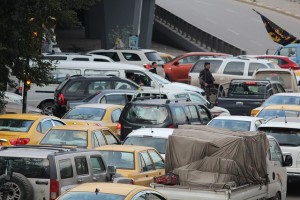Once but never again! / One time only! [Dutch phrase of the week]
Literally “One time, never again” this informal expression implies that the experience was bad or disappointing and you have no intention to go through that again voluntarily. Therefore it is a bit stronger than just a ‘one time affair’.
You will also hear the (more formal) expression “Eens, maar nooit weer”, which has the same meaning.
Examples:
– “Ik ben vanochtend met de tram naar het werk gegaan. Eén keer nooit meer, wat een plebs!”
(“I took the tram to work this morning. Never again I say, what plebs!”)
– “Ik heb laatst meegedaan aan speed-daten. Nou, één keer nooit meer, want dat werkt dus echt niet!”
(“I have recently participated in speed dating. Well that was a one time affair, because it really doesn’t work!”)
– “En ben je nog koffie wezen drinken in the Amsterdam American Hotel?” – “Ja, en het was één keer nooit meer, wat een afzetters!”
(“And, did you have coffee in the Amsterdam American Hotel?” – “Yes and I will never go back, what a rip-off!” Mind that “afzetten” is the verb for “serious overcharging” for something (goods or service). The use of the verb “wezen” indicates an activity (a longer period of time).)

 This phrase is used when things are difficult or almost impossible to accomplish or when a situation is tough in general. And this can be anything, from lousy weather to climbing the Mount Everest and from boring presentations to difficult exams. You can use it as part of a sentence but also on its own.
This phrase is used when things are difficult or almost impossible to accomplish or when a situation is tough in general. And this can be anything, from lousy weather to climbing the Mount Everest and from boring presentations to difficult exams. You can use it as part of a sentence but also on its own. You can use this phrase to conclude your explanation of how something is done. Usually it implies that it is not all that difficult.
You can use this phrase to conclude your explanation of how something is done. Usually it implies that it is not all that difficult.